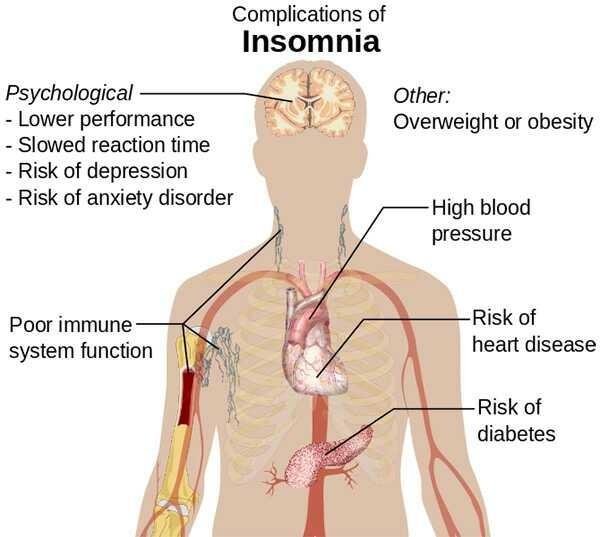The effect of staying up at night
Sleep patterns are less regular, can affect your body health. Sleeping late at night but wanting to get up early is to play the hardest time possible. Because your body takes a normal break 7-8 hours.

The effects of staying up late will be difficult to concentrate, can cause high blood pressure, and many more.
- Decreased Concentrations
Good sleep plays an important role in thinking and learning. Lack of sleep can affect many things. First, it interferes with alertness, concentration, reasoning, and problem solving. This makes learning difficult and inefficient. Second, the nighttime sleep cycle plays a role in "strengthening" the memory in the mind. If you are not getting enough sleep, you will not be able to remember what you learned and experienced during the day.
- Serious Health Problems
Sleep disturbance and chronic sleep deprivation can bring you at risk:
* Heart disease Heart attack Heart failure Heart.
* Irregular print High blood.
* PressureDecreased Concentrations
Good sleep plays an important role in thinking and learning. Lack of sleep can affect many things. First, it interferes with alertness, concentration, reasoning, and problem solving. This makes learning difficult and inefficient. Second, the nighttime sleep cycle plays a role in "strengthening" the memory in the mind. If you are not getting enough sleep, you will not be able to remember what you learned and experienced during the day.
- Decreased Sex Passion
Experts report, sleep deprivation in men and women lowers libido levels and encourages sexual intercourse. This is because the energy is drained, drowsiness, and tension is increased. For men who suffer from sleep apnea-a troubling breathing problem during sleep, causes sexual arousal to sluggish. A study published in the Journal of Clinical Endocrinology & Metabolism 2002 showed, almost all people who suffer from sleep apnea have low testosterone levels. And nearly half of people who suffer from severe sleep apnea have low testosterone levels at night.
- Cause Depression

In a 1997 study, researchers from the University of Pennsylvania reported people who slept less than 5 hours per day for seven days causing stress, anger, sadness, and mental fatigue. In addition, lack of sleep and sleep disorders can cause depression symptoms. The most common sleep disorder, an insomnia that has a strong association with depression. In a 2007 study involving 10,000 people, it was revealed that people with insomnia are 5 times more susceptible to depression. In fact, insomnia is often one of the first symptoms of depression. Insomnia and no appetite due to depression are related. Lack of sleep exacerbates the symptoms of depression and depression makes it harder for you to sleep. On the plus side, a good sleep pattern can help treat depression.
- Affects Skin Health

Most people experience pale skin and puffy eyes after a few sleepless nights. The circumstances are true because chronic lack of sleep can lead to dull skin, fine lines on the face and dark circles under the eyes. If you do not get enough sleep, your body releases more stress hormones or cortisol. In excessive amounts, cortisol can break down skin's collagen, or proteins that keep skin smooth and elastic. Lack of sleep can also cause the body to release less growth hormone. When we're young, human growth hormone drives growth. In this case helps increase muscle mass, thicken the skin, and strengthen bones. "This happens when the body is sleeping soundly - what we call slow-wave sleep (SWS) - growth hormone released," said Phil Gehrman, PhD, CBSM, Assistant Professor of Psychiatry and Clinical Director of Behavioral Sleep Medicine Program University of Pennsylvania, Philadelphia.
- Forgetful
Do not want to forget the best memories of your life? Try multiply sleeping. In 2009, researchers from the United States and France found that brain events called "sharp wave ripples" responsible for strengthening memory in the brain. This event also transfers information from the hippocampus to the neocortex in the brain, where long-term memories are stored. Sharp wave ripples occur mostly during sleep.
- The body is so stretchy
If you ignore the effects of lack of sleep, be prepared with the threat of being overweight. Sleep deprivation is associated with increased hunger and appetite, and may become obese. According to a 2004 study, people who slept less than six hours a day, nearly 30 percent tended to be fatter than those who slept seven to nine hours a day. Recent research has focused on the relationship between sleep and the peptides that regulate appetite. Ghrelin stimulates hunger and leptin signals satiety to the brain and stimulates appetite. Short sleep time is associated with decreased leptin and an increase in ghrelin. Lack of sleep not only stimulates appetite. It also stimulates the desire to eat fatty foods and high carbohydrate foods. Ongoing research examining whether proper sleep should be a standard part of a weight loss program.essureStrokeDiabetesAccording to some studies, 90 percent of insomniacs - sleep disorders characterized by difficulty sleeping and staying awake all night - also experience similar health risks.